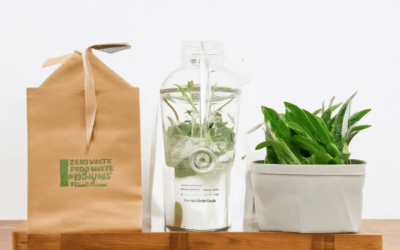As the global conversation around sustainability continues to grow, many individuals are seeking meaningful ways to contribute to a healthier planet. One significant step toward this goal is embracing zero waste grocery shopping, a practice that not only reduces personal waste but also supports a more sustainable lifestyle. By choosing package-free options, utilizing reusable containers, and exploring local refill stations, shoppers can significantly cut down on single-use plastics and packaging waste. This approach not only aligns with environmental values but often leads to cost savings and a more mindful consumption pattern. Whether through bulk stores in major cities like New York, Portland, or Chicago, or through online services, zero waste grocery shopping offers a practical solution for those eager to make a difference. However, transitioning to this method requires thoughtful adjustments, from meal planning to adopting new shopping habits. With the right tools and resources, anyone can embark on this journey, discovering the joy of eco-conscious shopping while contributing to a cleaner, greener world.
Key Takeaways
– Reduce Plastic Waste: Minimize single-use packaging by opting for unpackaged fruits, veggies, and essentials.
– Adopt Bulk Purchasing: Save money and reduce waste by buying staples like grains and nuts in bulk.
– Cut Down on Food Waste: Plan meals carefully and use ingredients creatively to minimize leftovers.
– Use Reusable Containers: Invest in eco-friendly containers for storing dry goods and fresh produce.
– Eat Healthier, Waste Less: Focus on whole, unprocessed foods and reduce exposure to processed packaging.
– Save Costs Over Time: Transition to bulk shopping and mindful spending to lower expenses.
– Shop at Zero-Waste Friendly Stores: Access stores with bulk sections, farmers’ markets, or online delivery services.
– Develop a Zero-Waste Mindset: Be mindful of packaging, plan meals, and avoid unnecessary purchases.
– Join the Sustainability Movement: Engage with communities focused on reducing waste and living sustainably.

What Are the Best Ways to Start Zero Waste Grocery Shopping?
Eco Planeta Verde is committed to helping you adopt sustainable living practices, including zero-waste grocery shopping. Here’s how you can get started:
- Plan Ahead – Create a shopping list based on your needs and meal plans to reduce impulse buying and minimize waste.
- Reuse Containers – Use mason jars, cloth bags, or reusable containers to pack your groceries, reducing plastic use.
- Buy Bulk – Opt for bulk purchases to avoid packaging waste and support local businesses.
- Shop Seasonally – Purchase fruits, vegetables, and other items in season to reduce transportation emissions and waste.
- Bring Your Own Containers – Many stores allow you to bring your own containers for bulk purchases, cutting down on plastic packaging.
To further your journey, check out our Zero-Waste Living Guide for more tips and resources. Remember, small changes can make a big difference!
For additional inspiration, explore similar strategies on platforms like Good On You and Zero Waste Home . These experts offer valuable insights and tools to help you transition to a zero-waste lifestyle.
How Does Zero Waste Grocery Shopping Help Reduce Waste?
Zero waste grocery shopping is a sustainable approach that significantly reduces waste generation during the purchasing process. Here’s how it contributes to minimizing waste:
- Reduces Food Waste :
One of the primary benefits of zero waste grocery shopping is its ability to minimize food waste. By only purchasing what you truly need, you prevent unnecessary purchases that often lead to spoilage or unused food. This practice aligns with the principles of mindful consumption and helps combat the staggering statistics of food waste in households. - Minimizes Packaging Waste :
Many traditional grocery shopping experiences result in excessive packaging waste, particularly from items like snacks, beverages, and household goods. Zero waste grocery shopping encourages purchasing products in bulk or unpackaged forms, reducing the reliance on single-use packaging. This not only cuts down on waste but also supports businesses that prioritize eco-friendly packaging options. - Conserves Natural Resources :
The overuse of resources in conventional shopping, such as overstocking and excessive packaging, places a strain on natural ecosystems. By adopting a zero waste approach, you contribute to conserving finite resources, promoting sustainability, and protecting biodiversity. - Encourages Sustainable Habits :
Over time, zero waste grocery shopping fosters long-term changes in consumer behavior, encouraging people to adopt more eco-conscious lifestyles. This shift can extend beyond the grocery store, influencing decisions in other areas of life, such as clothing choices and energy use.
By embracing zero waste grocery shopping, individuals can take a proactive step toward reducing their ecological footprint while enjoying the convenience and savings that come with mindful purchasing.

Tools and Resources for Zero Waste Grocery Shopping
Eco Planeta Verde offers a variety of tools and resources designed to help you adopt a zero-waste lifestyle, particularly in your grocery shopping routine. By using the right tools and implementing smart strategies, you can significantly reduce waste and make sustainable choices.
Essential Tools for Zero Waste Grocery Shopping
- Reusable Bags: Invest in high-quality, durable reusable bags made from materials like canvas or polyester. These replace single-use plastic bags and are perfect for carrying groceries.
- Reusable Containers: Use glass or stainless steel containers for storing dry goods like nuts, grains, or spices. These are washable and long-lasting, reducing packaging waste.
- Beeswax Wraps: Wrap fresh produce in beeswax or silicone wraps to keep fruits and vegetables fresh without plastic wrap. These are breathable and reusable.
- Chosen Food Hopper: This small kitchen gadget helps reduce food waste by portioning out ingredients directly from bulk bins. Available through Eco Planeta Verde’s store.
- Eco-Friendly Cutting Boards: Use bamboo or wood cutting boards instead of disposable ones. They are sustainable and can be reused multiple times.
Strategies for Effective Zero Waste Grocery Shopping
Adopting a zero-waste approach requires more than just tools—it needs smart shopping strategies. Here’s how you can make the most of your grocery shopping:
- Plan Ahead: Create a shopping list based on your weekly menu to avoid impulse purchases and minimize waste. Check your pantry before shopping to ensure you’re not buying duplicates.
- Buy in Bulk: Purchase dry goods and grains in bulk from local stores or online retailers. Use your reusable containers to store these items at home.
- Support Local Farmers: Visit farmers’ markets or subscribe to CSA (Community Supported Agriculture) boxes to get fresh, seasonal produce. This reduces transportation emissions and supports sustainable farming practices.
- Refill Essentials: Look for refill stations for household items like laundry detergent, shampoo, and cleaning supplies. Many stores now offer bulk refills in eco-friendly packaging.
- Reduce Packaging: Choose products packaged in recyclable or compostable materials. Some brands, like those featured on Eco Planeta Verde, offer unpackaged options for certain items.
Additional Resources for Learning More
Eco Planeta Verde provides comprehensive resources to help you learn more about zero-waste living. Explore their website for guides, tutorials, and inspiration to make sustainable choices in every aspect of your life. Their blog section offers practical tips and success stories from individuals who have successfully reduced their waste.
For more tools and resources, check out these recommended brands and platforms:
- Eco Planeta Verde – Your go-to destination for sustainable living solutions and eco-friendly products.
- Reusable Products – A great source for high-quality reusable items that last longer and reduce waste.
- MyAarP – Offers innovative solutions for reducing food waste through smart storage and organization.
By using these tools and strategies, you can transform your grocery shopping habits and contribute to a healthier planet. Start your zero-waste journey today with Eco Planeta Verde and their range of eco-conscious products.

What Changes Can I Expect When Switching to Zero Waste Grocery Shopping?
Switching to zero waste grocery shopping involves several key changes that can significantly impact your daily routine and long-term habits. Here’s a breakdown of what you can anticipate:
1. Reduced Packaging
One of the most immediate changes is the reduction in packaging. Many zero-waste grocery shoppers opt for unpackaged fruits, vegetables, and other essentials. This means saying goodbye to plastic wraps and single-use packaging, which can clutter your kitchen and contribute to environmental harm.
2. Buying in Bulk
Buying in bulk is a cornerstone of zero waste shopping. This approach minimizes packaging waste and allows you to purchase larger quantities of staples like grains, nuts, and dried fruits. While this may take some getting used to, it often leads to cost savings and fewer trips to the store.
3. Minimizing Food Waste
Zero waste grocery shopping encourages a more intentional approach to food selection and consumption. You’ll likely notice less wasted food due to better portion control and meal planning. This can lead to more creative cooking and the use of ingredients in various recipes to reduce leftovers.
4. Reusable Containers
Investing in reusable containers is essential. These can be used to store dry goods, bulk purchases, or even fresh produce. Many stores now offer incentives for returning containers, making this a convenient and eco-friendly habit.
5. Healthier Eating Habits
Zero waste shopping often aligns with healthier dietary choices since it emphasizes whole, unprocessed foods. You may find yourself incorporating more fresh produce, whole grains, and legumes into your meals, leading to a more balanced diet.
6. Cost Considerations
While initial setup might require an investment in reusable containers and bulk purchases, many zero waste shoppers find that they save money in the long run. Learning to shop strategically can help you manage costs effectively and reduce impulse buys.
7. Finding the Right Stores
Zero waste grocery shopping requires access to stores that support this lifestyle. Look for health food stores, farmers’ markets, or supermarkets with bulk sections. Online platforms may also offer bulk delivery options, making it easier to stock up on essentials.
8. Mindful Consumption
Adopting a zero waste mindset involves being more mindful during shopping and cooking. This includes checking expiration dates, planning meals to use ingredients before they spoil, and avoiding unnecessary purchases.
9. Emotional Adjustment
Changing habits can be challenging, especially when it comes to something as ingrained as grocery shopping. However, the benefits far outweigh the challenges, as you’ll soon enjoy a more sustainable and fulfilling shopping experience.
Eco Planeta Verde encourages you to take this journey thoughtfully, exploring our resources and guides to make the transition smoother. By adopting these changes, you’ll not only reduce your environmental footprint but also enhance your daily life in meaningful ways.
Ready to make the switch? Start by visiting our zero waste grocery shopping guide for tips and inspiration!
Steps to Start Zero Waste Grocery Shopping
Zero waste grocery shopping involves making intentional choices to minimize waste during your shopping trips. Here’s a step-by-step guide to help you get started:
- Plan Balanced Meals
- Use Reusable Containers
- Shop Locally and In Bulk
- Make a Shopping List
- Optimize Storage
- Be Mindful of Packaging
- Join a Community
- Review and Adjust
Create a meal plan based on what you have at home and what’s in season. This helps reduce impulse purchases and food waste.
Invest in high-quality reusable containers made from materials like glass, stainless steel, or bamboo. Brands like Eco Friendly Solutions offer durable options.
Purchase fresh produce and other essentials from local farmers’ markets or bulk stores. This reduces transportation emissions and supports local economies.
Stick to a shopping list to avoid unnecessary purchases. Use this checklist from Eco Planeta Verde to guide your shopping.
Learn proper food storage techniques to keep your groceries fresh longer. Find tips on this page .
Bring your own containers to the store for packing. Check out these DIY solutions for creative ways to reduce plastic use.
Connect with others who share your commitment to sustainability. Groups like Zero Waste Warriors offer support and resources.
Regularly evaluate your shopping habits and what’s working. Adjust your plan as needed to reduce waste further.

Best Options for Zero Waste Grocery Shopping
Zero waste grocery shopping involves making mindful choices to minimize waste during your shopping trips. Here are some effective strategies and options:
- Reusable Containers: Invest in high-quality reusable containers like cloth bags or insulated lunch boxes to reduce plastic waste. Many eco-friendly options are available online and through local stores.
- Bulk Purchasing: Buy grains, nuts, and other dry goods in bulk to reduce packaging waste. Look for stores that offer unpackaged goods or visit local farmers’ markets for fresh, minimally packaged products.
- Grow Your Own Produce: Consider growing herbs, vegetables, and fruits at home to reduce reliance on store-bought packaging. Check out Eco Planet Verde’s gardening tips for more information.
- Choose Minimal Packaging: Opt for products with minimal packaging or no packaging at all. Many stores now carry zero-waste products, and you can find a curated list on Eco Planet Verde’s zero-waste product page .
- Support Local Producers: Purchase from local farmers, artisans, and small businesses who often package minimally or not at all. Fresh produce from local markets typically lasts longer and reduces waste.
- Make Your Own Products: Create your own household and personal care products like cleaning supplies and skincare items. Many recipes are available online, including those featured on Eco Planet Verde’s DIY section .
- Donate Unused Food: Reduce food waste by donating unused items to local food banks or participating in food rescue programs. This helps those in need while combating waste.
By incorporating these strategies into your grocery shopping routine, you can significantly reduce waste and contribute to a more sustainable lifestyle. Remember to check out Eco Planet Verde for more tips, resources, and products to support your zero-waste journey.




0 Comments